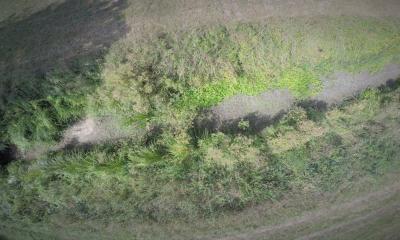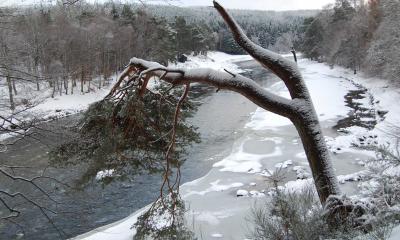VeWa
Short profile
Duration


VeWa is funded by the European Research Council (ERC) and examines the impacts of climate change on vegetation-water linkages along a northern climatic gradient investigating six intensively studied experimental sites in the UK, US, Canada and Sweden.
VeWa aims to increase the ability to predict the consequences of climate change on water resources by looking at what is occurring in high-latitudes headwater (ie, the “water towers of the world”) catchments in the UK, Canada and Sweden. Projections by the Intergovernmental Panel on Climate Change (IPCC) show that climate warming will be particularly high in northern latitudes. The hydrological implications are profound; in this region even small temperature changes will result in more rain rather than snow in winter; more rapid melt rates and increased flood risk in spring; less water available in summer due to less rain and more evaporation. These changes will affect vegetation communities, both in terms of natural succession of plants and new management of crops exploiting the milder climate. It is unknown how such vegetation changes might affect the water balance in northern regions and how plants will influence water availability.
The type of extensive empirically-based site-comparisons that Dörthe and her team are making have never before been conducted in high-latitude catchments. The team delivers a comprehensive understanding of the critical role of vegetation in water partitioning and cycling in different ecohydrological units along an environmental gradient from the sub-boreal to sub-arctic. The team look at how water is stored, how it travels, how it is released back into the system, and how long these processes take, as well as the implications this holds for climate change in high-latitude ecosystems. No one actually knows how well the current water models represent what is actually happening, which means that no one actually know whether the predictions of climate change due to water resources are actually correct.
With this project, Dörthe is hoping to find out how plant water use (ie, how vegetation water use linked to soil water, groundwater and surface waters) will affect and possibly alter signals of potential climate change. Also, the comparisons made within this project will provide a base-line for evaluating how vegetation affects floods and droughts (aka evaluating how climate change affects vegetation which then affects stream flow) in northern environments.
- This interdisciplinary project is based upon understanding the ecohydrology of soil-vegetation assemblages (hydrotopes) along a climate gradient as a precursor to understand future response to change in high-latitude upland catchments.
- The overarching goal of this project is to understand the internal processes of water storage, transmission and release in high latitude catchments (cf. how vegetation water use is linked to soil water, groundwater and surface waters).
- The project examines this ecohydrological coupling along representative landscape transects in four high-latitude experimental catchments located in four different terrestrial ecotones.
- It also examines how water storage, transmission and release might be influenced by differences in seasonality and climatic variability in these distinct geographic regions.
International Project Partners
- Professor James Buttle Department of Geography, Trent University, Peterborough, Canada
- Professor Sean Carey Watershed Hydrology Group, McMaster, Canada
- Professor Matthew J. Kohn Stable Isotope group, Boise State University, USA
- Professor Hjalmar Laudon CCREW, Swedish University of Agricultural Sciences, Umea, Sweden
- Professor Marco Maneta Geosciences Department, The University of Montana, USA
- Professor Jeff McDonnell Global Institute for Water Security, University of Saskatchewan, Saskatoon, Canada
- Professor Jim McNamara Hydrology, Geomorphology, Department of Geosciences, Boise State University, USA
- Dr. Christopher Spence National Hydrology Research Centre, Environment Canada, Saskatoon, Canada
- Professor Chris Soulsby School of Geosciences, University of Aberdeen, Scotland
Project Postdocs:
- Dr. Audrey Douinot
- Dr. Sylvain Kuppel
- Dr. Bernhard Scheliga
- Dr. Aaron Smith
- Dr. Matthias Sprenger
- Dr. Claire Tunaley
- Dr. Marjolein Van Huijgevoort
- Dr. Hailong Wang
Linked PhD/MSc projects:
- Lukas Kleine: "Investigating ecohydrological feedbacks on age of water storage and fluxes in landscapes" (PhD)
- Lena-Marie Kuhlemann: "Ecohydrological controls on urban groundwater recharge: an isotope-based modellingapproach" (PhD)
- Thea Ilaria Piovano: "Advancing spatially distributed model to understand water storage, flux and age dynamics" (PhD)
- Bernhard Scheliga: "Understanding spatial and temporal dynamics and linkages between subsurface and surface hydrological processes" (PhD, completed)
- Claire Tunaley: "Integrating high-frequency DOC data, isotopes and modelling to assess flow path, connectivity and water age" (PhD, completed)
- Hannah Braun: "Influence of vegetation canopy on interception, precipitation partitioning and isotope inputs in northern upland catchments" (MSc, completed)
VeWa Publications & Presentations >
Photo: Dörthe Tetzlaff
Photo: Dörthe Tetzlaff
Photo: Dörthe Tetzlaff
European Research Council (ERC)






